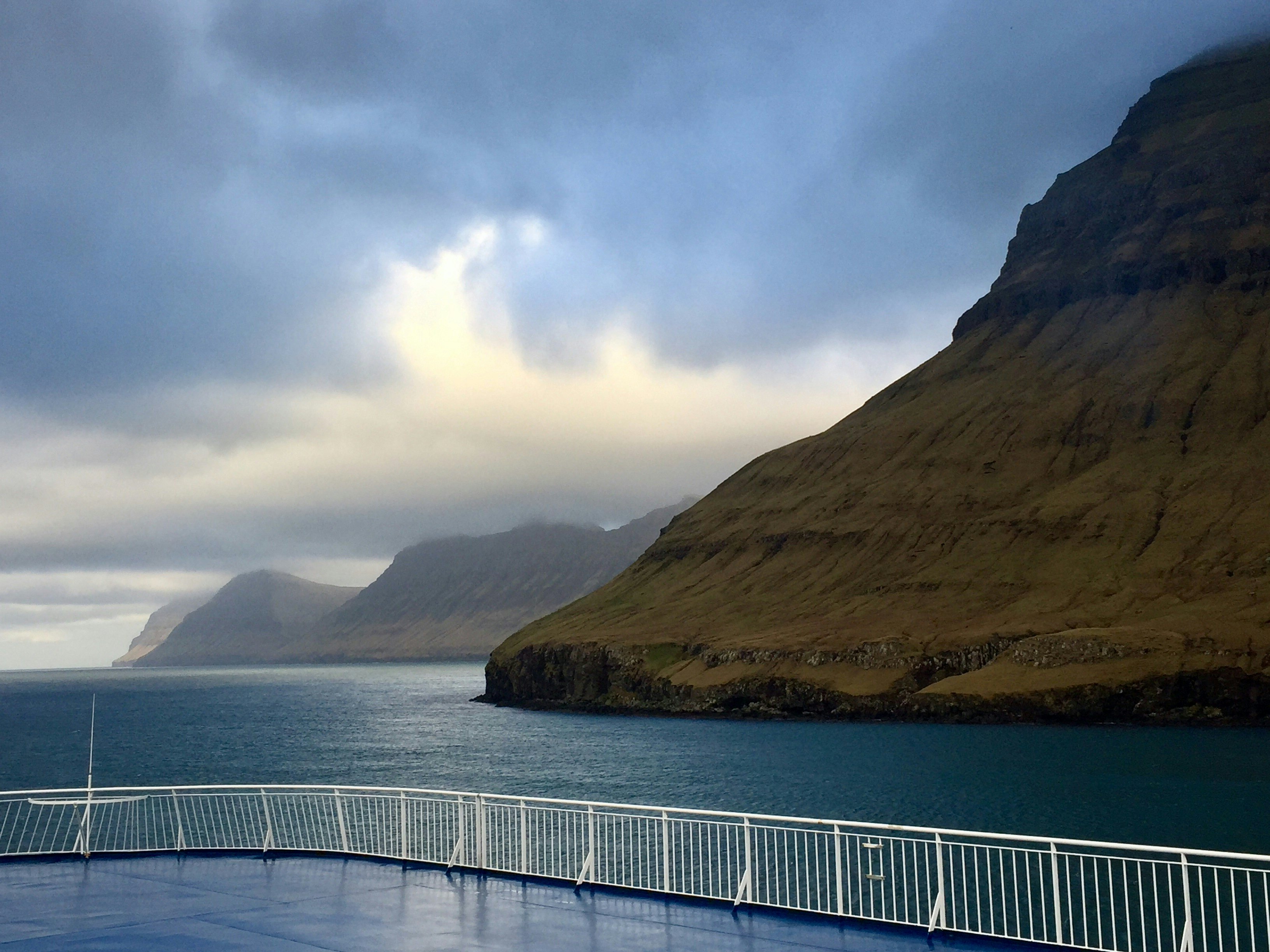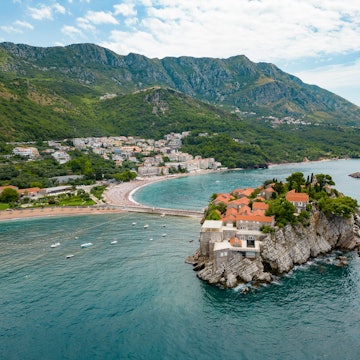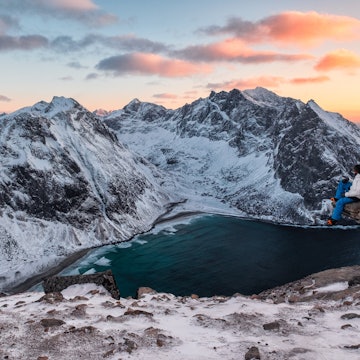
Sailing from Denmark to Iceland takes days - but it's the best way to get there
Oct 29, 2021 • 6 min read

The Tórshavn mountainous coast on view from the decks of the MS Norröna © Seeliger / ullstein bild / Getty Images
While Iceland is busy headlining countless travel blogs, design magazines and social media feeds. The country's position near the top of global bucket lists seems rock-solid. If you haven't yet visited, you're probably planning to; if you've been, you likely want to return. And the best way to get there, is through the slow and scenic route.

Most visitors to Iceland fly into Keflavík (the country's international airport) to begin their vacation. Fans of slow travel who are looking for a point of difference, a super-scenic voyage or a means to reduce holiday costs (by bringing their own car or campervan), should consider sailing on Smyril Line's Norröna, the only ferry that cruises from Hirtshals in northern Denmark to Seyðisfjörður in east Iceland, via the spectacular Faroe Islands.
Easy, scenic and an adventure you'll remember, here's why a ferry from Denmark is a great way to get to Iceland.
The slow and scenic journey
Sailing time is around 36 hours from Denmark to the Faroe Islands and 19 hours from the Faroes to Iceland. The ferry's home port is Tórshavn, the capital of the Faroe Islands, a small archipelago with a population of just 50,000 that's a self-governing country within the Kingdom of Denmark.
All journeys pause in Tórshavn and stopovers range from six hours to three days, depending on the season's schedule. Since the ferry runs weekly, there's also the option of staying a full week or two for a more thorough Faroe foray.

It's worth noting that seasickness is a possibility on the voyage, especially on the open seas northwest of the Shetland Islands. The boat is large and has good stabilizers but this is the North Atlantic Ocean, after all, and the weather can turn nasty. It's a good idea to pack remedies.
Emerald peaks and whales, the scenic highlights
Binoculars and cameras at the ready: sail past the Shetland Islands (part of the UK) en route between Denmark and the Faroes is a treat, and in clear weather, you'll see distant oil rigs and tankers while sailing the North Sea.
Arriving into and sailing out of Tórshavn is magical. As the boat pushes northwest to Iceland it travels a relatively narrow passage between the islands of Eysturoy and Kalsoy, and for two hours the views of emerald peaks will leave you entranced.
Snow-topped peaks and waterfalls welcome you to Iceland in dramatic style as the ferry sails 17km up Seyðisfjörður to the small, artsy town at the head of the fjord.
Throughout the voyage be on the lookout for birdlife, and possibly whales, especially in the warmer months.

All about the boat
The Norröna is a blend of freight ship, passenger ferry and cruise ship. It's no luxury cruise liner but it has excellent facilities. Cabins vary in size (all with bathroom), or there are budget 'couchette' berths that are effectively a dorm bed in the bowels of the ship.
There are no cooking facilities for passengers on board, but there's a handful of restaurants: the Simmer Dim Steakhouse is upscale (reservations advised), and there are cheaper buffet options and a diner. The cafe bars are a good place to while away the hours, especially the Sky Bar with a view, serving Føroya Bjór, the beer brewed in the Faroes.
There's a souvenir and duty-free shop, and distractions like a small cinema, swimming pool and fitness center, and kids' play areas. More decadent are the hot tubs on deck that you can rent by the hour.
The crowd varies with the seasons, from Icelanders and Faroe Islanders sailing to and from Europe for business or pleasure, to holidaymakers treating the summer sailings as a cruise vacation. Plenty of outdoorsy Europeans load up their 4WD camper trailers for full-scale expeditions in Iceland; you'll likely meet motorcyclists and cyclists too, in warmer months.
The ports are the destination
Hirtshals, Denmark
Hirtshals is a small, unremarkable, ferry-dominated town and its terminals are busy loading and unloading ferry passengers from Norway, who visit for the cheaper meat and booze (hey, it's all relative!).

Town attractions include the long stretch of beach at Tornby Strand and the family-friendly Nordsøen Oceanarium, one of northern Europe's largest aquariums. The waterfront area has a few eating options and supermarkets for grabbing supplies before you board the ferry.
Given that the Norröna departs Hirsthals at 3pm or 3.30pm, consider staying further afield and driving to the port on the morning of the sailing day. Great, visit-worthy options include Aarhus (Denmark's second city; 185km south of Hirtshals), Billund (home to Legoland; 240km south) or beautiful Skagen (49km away to the north).
Tórshavn, Faroe Islands
Named after the Norse god Thor, Tórshavn is one of the world’s smallest capitals, and there's a colorful toy-town appearance to the city as you arrive and depart.
In summer, it's possible to book stopover packages and onshore excursions through the ferry operator to help you explore the town and beyond, but local taxi companies can help you make the most of shorter stopovers with private tours to key sights all year round.

Tórshavn's charming historical core is Tinganes, a petite peninsula delightfully jumbled with pretty turf-roofed cottages and rustic, red-painted government buildings. It's a short walk from the terminal. Fans of Scandi crime dramas (and ace knitwear) should visit Guðrun & Guðrun, the Tórshavn store from the women who designed that sweater worn by Detective Sara Lund in Danish TV drama The Killing.
Gourmands should plan a stopover around Koks, an acclaimed locavore restaurant 10km south of Tórshavn in the pretty hamlet of Kirkjubøur. In 2017, Koks was awarded the Faroes' first Michelin star.
Seyðisfjörður, Iceland
Don't be in a hurry to leave Seyðisfjörður, which sits nestled under mountains at the end of its long namesake fjord. It's one of Iceland's loveliest small towns and a hive of creativity. Browse the old timber houses (home to some great design and handicraft stores), take a summertime kayaking tour with Hlynur Oddsson or a mountain-bike ride and enjoy some super-fresh sushi at Norð Austur Sushi & Bar. Skaftfell is a cool hub, serving up beers, pizzas and conviviality.
This long-dormant Icelandic volcano is active - and people are hiking to see it

When it's time to explore more of Iceland, the 25km road (Rte 93) that climbs up and over the mountain pass offers some spectacular vantage points. Rte 93 joins the Ring Road (Rte 1, which circumnavigates Iceland) at the hub town of Egilsstaðir. Buses run year-round between Seyðisfjörður and Egilsstaðir, and from Egilsstaðir northwest to Akureyri and on to Reykjavík (in summer, buses also run to Höfn then along the south coast to Reykjavík).
Practical information
The Norröna operates year-round, on a schedule that varies with season. The high season covers an 11-week period from mid-June to late August, when prices – and demand – peak (book well ahead); the low season is from mid-September to April. There are two short mid-season periods, in May-June and early September. Fares are determined by season, cabin choice, and what vehicle (if any) you are traveling with, and can be bumped up with onboard meal plans or stopover packages.
You might also like:
From geysers to guillemots: the 10 best natural wonders in Iceland
It's possible to explore Iceland on a budget. Here's how.
Why you should check out these magical Icelandic beaches
Carolyn Bain traveled to Denmark, the Faroe Islands and Iceland with assistance from Smyril Line (smyrilline.com). Lonely Planet contributors do not accept freebies in exchange for positive coverage.















